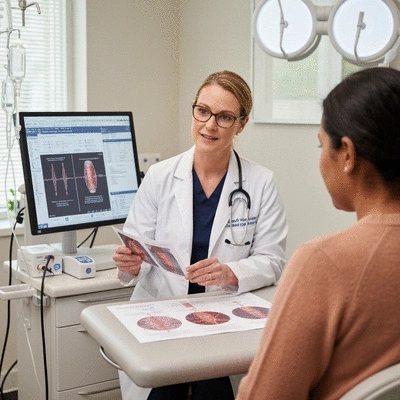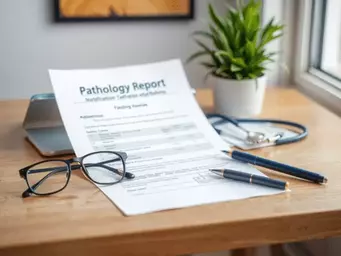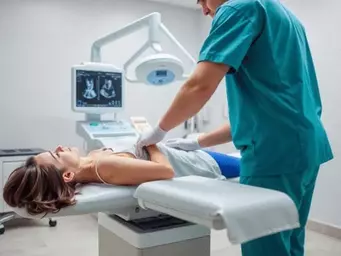As you prepare for a biopsy, understanding the management of blood thinners can be critical for your safety. These medications can complicate the procedure, and knowing how to handle them effectively empowers you to take charge of your healthcare decisions.
What You Will Learn
- Importance of Managing Blood Thinners: Effective management of blood thinners like aspirin, warfarin, and heparin is essential to minimize complications during a biopsy.
- Significance of INR Monitoring: Regular monitoring of your International Normalized Ratio (INR) is crucial to assess blood clotting ability before the procedure.
- Risks of Bleeding and Thrombosis: Understanding the risks associated with stopping blood thinners can help prevent both bleeding complications and thromboembolism.
- Communication with Healthcare Providers: Open dialogue with your healthcare team ensures personalized care and safe management of your medication regimen.
Biopsy Preparation: Managing Blood Thinners
Understanding the critical steps in managing blood thinners before a biopsy is essential for patient safety. The visual below highlights key considerations, from medication types to monitoring levels and overall risk assessment.
Key Blood Thinners
- Aspirin: Increases bleeding risk.
- Warfarin: Requires INR monitoring.
- Heparin: Hospital-managed.
Why Stop Blood Thinners?
- Minimize bleeding risk during procedure.
- Reduce longer recovery times.
- Prevent additional medical interventions.
Importance of INR Monitoring
INR (International Normalized Ratio) levels assess blood clotting ability.
Too high = bleeding risk; Too low = clot risk. Collaborate with your provider.
The Significance of Managing Blood Thinners Prior to a Biopsy
When it comes to preparing for a biopsy, understanding the role of blood thinners is crucial. These medications, which include common drugs such as aspirin, warfarin, and heparin, are used to prevent blood clots but can also complicate biopsy procedures. Managing these medications properly can make a significant difference in your safety and the overall success of the procedure.

Each type of blood thinner works a bit differently, so it's important to recognize how they can impact your health. For example, while aspirin is often used to manage heart issues, warfarin is commonly prescribed for those with atrial fibrillation. Understanding these differences can empower you to take an active role in your healthcare decisions.
Understanding Blood Thinners and Their Role
- Aspirin: Often used for heart health, can increase bleeding risk.
- Warfarin: A long-term anticoagulant requiring regular INR monitoring.
- Heparin: Typically used in hospital settings, needs careful management.
Each of these medications has specific implications when it comes to biopsy procedures. For instance, stopping blood thinners like warfarin before a biopsy is often necessary to minimize the risk of bleeding. For more detailed insights into perioperative management of antithrombotic medications, you can refer to guidelines from the American Academy of Family Physicians.
Why Stopping Blood Thinners is Critical Before a Biopsy
Stopping blood thinners before a biopsy is essential because these medications can significantly increase the risk of bleeding during the procedure. If you’ve ever heard the saying “a little knowledge goes a long way,” it certainly applies here! Understanding the risks associated with these medications can help you and your healthcare team make informed decisions. According to a study published by the National Institutes of Health, careful management of anticoagulants is key to preventing complications.

Bleeding complications can lead to longer recovery times and, in some cases, may even necessitate additional medical interventions. This is why it's imperative to communicate with your healthcare provider about your medication regimen well in advance of your biopsy. The American Society for Gastrointestinal Endoscopy also provides valuable practice guidelines on the management of antithrombotic agents.
The Importance of Monitoring INR Levels Before a Biopsy
Your INR (International Normalized Ratio) level is a critical factor in managing anticoagulation therapies like warfarin. Monitoring these levels helps assess your blood’s ability to clot properly, making it a key component of safety during a biopsy. As a patient, you might wonder, “What does my INR tell me?” Simply put, it indicates how well your blood can stop bleeding.
For patients on blood thinners, having a well-managed INR level can help ensure that your biopsy procedure goes smoothly. If your INR is too high, there’s a greater risk of bleeding, and if it's too low, you may be at risk for blood clots. Therefore, working closely with your healthcare provider to monitor this level is vital.
We Want to Hear From You!
As you prepare for a biopsy, what concerns do you have about managing your blood thinners? Share your thoughts below:
Frequently Asked Questions About Blood Thinners and Biopsies
- Q: Why is managing blood thinners important before a biopsy?
- A: Managing blood thinners is crucial to minimize the risk of bleeding complications during the biopsy procedure and ensure patient safety.
- Q: What are some common blood thinners?
- A: Common blood thinners include aspirin, warfarin, and heparin. Each works differently and has specific implications for biopsy procedures.
- Q: Why do I need to stop blood thinners before a biopsy?
- A: Stopping blood thinners reduces the risk of excessive bleeding during the biopsy, which can lead to longer recovery times and potential additional medical interventions.
- Q: What is INR monitoring and why is it important?
- A: INR (International Normalized Ratio) monitoring assesses your blood's ability to clot. It's vital for patients on warfarin to ensure their blood is not too thin (high bleeding risk) or too thick (high clot risk) before a biopsy.
- Q: What are the risks of stopping blood thinners?
- A: While stopping blood thinners reduces bleeding risk, it can increase the risk of thromboembolism (blood clots). Your healthcare provider will weigh these risks based on your individual health.
- Q: Should I talk to my healthcare provider about my blood thinners before a biopsy?
- A: Absolutely. Open communication with your healthcare team is essential to develop a personalized plan for managing your medications safely before, during, and after your biopsy.
Summary of Key Points on Blood Thinners and Biopsy Safety
When it comes to preparing for a biopsy, understanding the role of blood thinners is crucial. These medications can significantly impact your safety during a procedure, making it essential to approach their management with care. Here’s a quick recap of the most important points:
- Monitor INR Levels: Keeping track of your International Normalized Ratio (INR) levels is vital to ensure proper coagulation before a biopsy.
- Evaluate Bleeding Risks: Each biopsy type carries specific bleeding risks that need to be assessed.
- Thrombotic Risks: Discontinuing anticoagulants can lead to thromboembolism, so understanding your individual risk factors is important.
- Consult Healthcare Providers: Personalized care and open communication with your healthcare team can help manage blood thinner protocols safely.
As we navigate the complexities surrounding biopsy procedures, it's important to remember that safety is our top priority. Each patient is unique, and at What Is A Biopsy, we emphasize the importance of tailored approaches for each individual’s needs.
Encouragement to Consult Healthcare Professionals
In conclusion, managing blood thinners before a biopsy is not something to take lightly. I urge you to consult with your healthcare professionals for guidance tailored to your specific situation. Their expertise will help ensure that you receive the safest possible care during your biopsy. Don’t hesitate to ask questions and voice any concerns you might have—this is your health, and being informed is a powerful tool!
Remember, the journey towards understanding your health begins with open dialogue. Reach out, seek clarity, and take confident steps forward! Your health is worth it!
Recap of Key Points
Here is a quick recap of the important points discussed in the article:
- Monitor INR Levels: Keeping track of your International Normalized Ratio (INR) levels is vital to ensure proper coagulation before a biopsy.
- Evaluate Bleeding Risks: Each biopsy type carries specific bleeding risks that need to be assessed.
- Thrombotic Risks: Discontinuing anticoagulants can lead to thromboembolism, so understanding your individual risk factors is important.
- Consult Healthcare Providers: Personalized care and open communication with your healthcare team can help manage blood thinner protocols safely.










